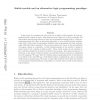257 search results - page 18 / 52 » An interval logic for natural language semantics |
RULEML
2004
Springer
14 years 1 months ago
2004
Springer
Abstract. Defeasible reasoning is a rule-based approach for efficient reasoning with incomplete and inconsistent information. Such reasoning is, among others, useful for ontology i...
TAPSOFT
1997
Springer
13 years 12 months ago
1997
Springer
The goal of this paper is to analyse semantics of algorithms with explicit continuous time with further aim to nd approaches to automatize model checking in high level, easily unde...
AI
2008
Springer
13 years 6 months ago
2008
Springer
Although classical first-order logic is the de facto standard logical foundation for artificial intelligence, the lack of a built-in, semantically grounded capability for reasonin...
CORR
1998
Springer
13 years 7 months ago
1998
Springer
In this paper we reexamine the place and role of stable model semantics in logic programming and contrast it with a least Herbrand model approach to Horn programs. We demonstrate ...
COSIT
2007
Springer
14 years 1 months ago
2007
Springer
Abstract. This paper analyses the semantics of natural language expressions that are associated with the intuitive notion of ‘place’. We note that the nature of such terms is h...

